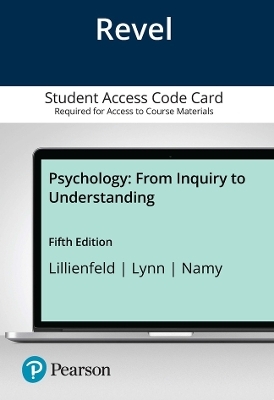
Learning From Data
Lawrence Erlbaum Associates Inc (Hersteller)
978-0-8058-6371-0 (ISBN)
- Titel ist leider vergriffen;
keine Neuauflage - Artikel merken
Learning from Data focuses on how to interpret psychological data and statistical results. The authors review the basics of statistical reasoning to helpstudents better understand relevant data that affecttheir everyday lives.
Numerous examples based on current research and events are featured throughout.To facilitate learning, authors Glenberg and Andrzejewski:
Devote extra attention to explaining the more difficult concepts and the logic behind them
Use repetition to enhance students’ memories with multiple examples, reintroductions of the major concepts, and a focus on these concepts in the problems
Employ a six-step procedure for describing all statistical tests from the simplest to the most complex
Provide end-of-chapter tables to summarize the hypothesis testing procedures introduced
Emphasizes how to choose the best procedure in the examples, problems and endpapers
Focus on power with a separate chapter and power analyses procedures in each chapter
Provide detailed explanations of factorial designs, interactions, and ANOVA to help students understand the statistics used in professional journal articles.
The third edition has a user-friendly approach:
Designed to be used seamlessly with Excel, all of the in-text analyses are conducted in Excel, while the book’s CD contains files for conducting analyses in Excel, as well as text files that can be analyzed in SPSS, SAS, and Systat
Two large, real data sets integrated throughout illustrate important concepts
Many new end-of-chapter problems (definitions, computational, and reasoning) and many more on the companion CD
Online Instructor’s Resources includes answers to all the exercises in the book and multiple-choice test questions with answers
Boxed media reports illustrate key concepts and their relevance to realworld issues
The inclusion of effect size in all discussions of power accurately reflects the contemporary issues of power, effect size, and significance.
Learning From Data, Third Edition is intended as a text for undergraduate or beginning graduate statistics courses in psychology, education, and other applied social and health sciences.
Contents: Preface. Why Statistics? Part I: Descriptive Statistics. Frequency Distributions and Percentiles. Central Tendency and Variability. z Scores and Normal Distributions. Part II: Introduction to Inferential Statistics. Overview of Inferential Statistics. Probability. Sampling Distributions. Logic of Hypothesis Testing. Power. Logic of Parameter Estimation. Part III: Applications of Inferential Statistics. Inferences About Population Proportions Using the z Statistic. Inferences About µ When o Is Unknown: The Single Sample t Test. Comparing Two Populations: Independent Samples. Random Sampling, Random Assignment, and Causality. Comparing Two Populations: Dependent Samples. Comparing Two Population Variances: The F Statistic. Comparing Multiple Population Means: One-Factor ANOVA. Introduction to Factorial Designs. Computational Methods for the Factorial ANOVA. Describing Linear Relationships: Regression. Measuring the Strength of Linear Relationships: Correlation. Inferences From Nominal Data: The X² Statistic.
| Erscheint lt. Verlag | 3.12.2009 |
|---|---|
| Verlagsort | Mahwah |
| Sprache | englisch |
| Maße | 178 x 254 mm |
| Gewicht | 68 g |
| Themenwelt | Geisteswissenschaften ► Psychologie |
| Mathematik / Informatik ► Mathematik | |
| ISBN-10 | 0-8058-6371-0 / 0805863710 |
| ISBN-13 | 978-0-8058-6371-0 / 9780805863710 |
| Zustand | Neuware |
| Haben Sie eine Frage zum Produkt? |
aus dem Bereich
